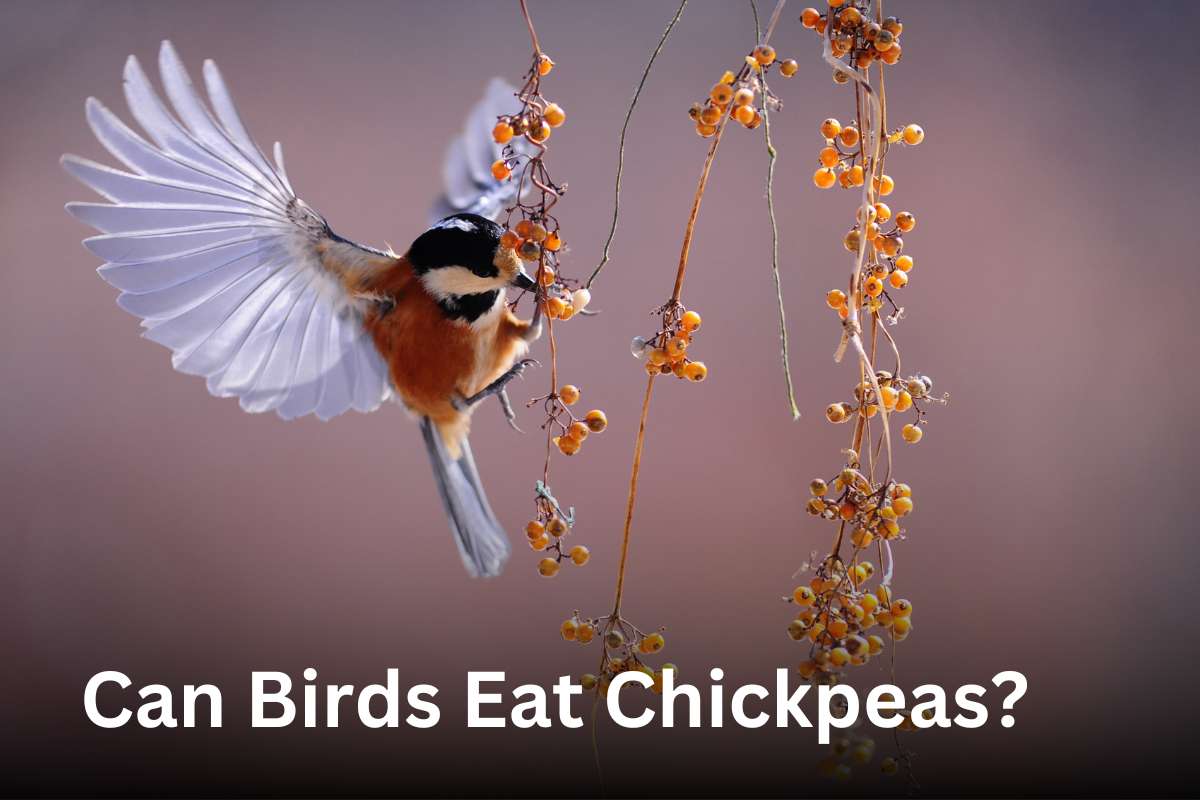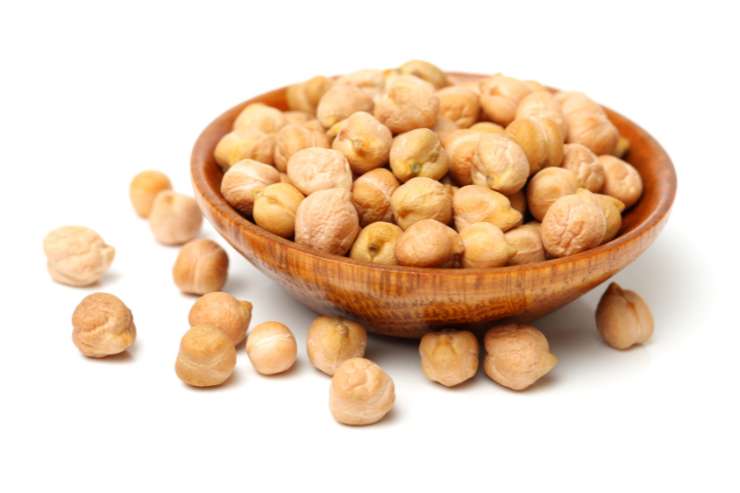Can Birds Eat Chickpeas?

Birds’ unique nutritional requirements frequently leave pet owners and bird enthusiasts wondering what foods are safe and beneficial for them.
Due to their high nutritional content, chickpeas, also known as garbanzo beans, are a mainstay in many human diets. But the issue arises: Can birds consume chickpeas?
This article covers chickpeas’ nutritional value, potential dangers, and how to prepare them safely for avian ingestion.
Nutritional Benefits of Chickpeas
Chickpeas are high in nutrients that are good for birds. They are a high-protein food necessary for bird growth, muscle development, and overall health.
The protein content of chickpeas can be especially advantageous for birds during the breeding season, moulting, or while recovering from illness or injury.
Chickpeas are high in protein and fiber, which improves digestion. Birds, like humans, require fibre to keep their digestive systems functioning properly.

A low-fiber diet might cause digestive problems like constipation or impaction.
Chickpeas are also rich in minerals and vitamins. They include high levels of vitamins B6 and B9 (folate) essential for metabolic activities and red blood cell production.
Minerals like iron, magnesium, and phosphorus promote bone health and energy production.
Potential Risks
While chickpeas provide many nutritional benefits, specific concerns should be considered.
One significant issue is the presence of anti nutrients such as lectins and phytic acid, which can impair nutrient absorption and digestion.
| Note: Phytic acid is a chemical found in numerous plant-based diets. Phytic acid decreases the absorption of iron, zinc, and calcium and may lead to mineral shortages. |
Proper cooking reduces these chemicals, but they should still be considered when feeding chickpeas to birds.
Raw chickpeas should never be fed to birds. They are hard and difficult to digest, offering a choking hazard and risk of digestive blockage.
In addition, raw chickpeas contain more anti-nutrients than cooked chickpeas.
Preparing Chickpeas for Birds
Adequate preparation is essential to feed chickpeas to birds securely. Begin by adequately washing the chickpeas to remove all dirt and impurities.
Soaking the chickpeas overnight in water softens them and reduces antinutrient levels. After soaking, boil the chickpeas until soft.
Avoid using salt, spices, or other condiments, as they might be detrimental to birds.
After cooking, let the chickpeas cool before serving them to your bird. Depending on your bird’s size and preferences, you can serve them whole or mashed chickpeas.
Smaller birds may prefer mashed chickpeas, while larger birds can tolerate whole chickpeas.
It’s crucial to remember that variety is the spice of life, even for your bird’s diet. Chickpeas are a great addition, but they’re just one part of a well-balanced menu.
Include a variety of seeds, fruits, veggies, and pellets in your bird’s diet to provide it with a well-rounded diet.
Types of Birds and Chickpeas
Different species of birds have different dietary requirements, which influences how chickpeas can be included in their meals.
1. Parrots:
Chickpeas’ high protein content benefits parrots such as budgerigars, cockatiels, and macaws. However, moderation is essential.

Whole chickpeas can be given to larger parrots as a treat on occasion. For smaller parrots, mashed chickpeas may be more acceptable.
2. Canaries and Finches:
These little birds have a faster metabolism and unique nutritional requirements. Chickpeas can be served in small, mashed pieces as an infrequent addition to their regular diet.
3. Pigeons and Doves:
Pigeons and doves are more used to eating a variety of seeds and grains. Chickpeas can be a rich source of protein and fiber when consumed in moderation.
Observations and Adjustments
When introducing chickpeas to your bird’s diet, pay close attention. Look for any signs of digestive trouble or allergic reactions.
If your bird displays signs of concern, stop eating chickpeas and consult a veterinarian.
Before making any major changes to your bird’s food, you should speak with an avian veterinarian or a professional with experience in avian nutrition.
The bird specialist can offer personalized recommendations based on the particular requirements of your bird species.
Conclusion
To summarize, when properly prepared and delivered, chickpeas can be a nutritious and healthy supplement to a bird’s diet.
They provide essential protein, fiber, vitamins, and minerals that aid in numerous aspects of avian health. To avoid any dangers, they should be cooked correctly and introduced gradually.
To encourage your feathered friend’s overall well-being, always include chickpeas in a balanced and diverse diet.
Chickpeas can be a nutritious treat for many bird species when adequately prepared and fed.
Frequently Asked Question
Are raw chickpeas safe for birds?
No, raw chickpeas are not suitable for birds. They are difficult to digest and might cause choking hazards. Furthermore, uncooked chickpeas include antinutrients such as lectins and phytic acid, which may hinder nutrient absorption and digestion.
How should chickpeas be prepared for birds?
The chickpeas should be carefully cleaned, soaked overnight, and cooked until tender. Do not add salt, spices, or food additives. Once cooked, let them cool before serving. Depending on your bird’s size and preferences, you can serve them whole or mashed chickpeas.
Can baby birds eat chickpeas?
Baby birds have different nutritional needs and are usually fed a customized diet by their parents or caregivers. Consult an avian veterinarian before feeding chickpeas or any other new food to newborn birds.






